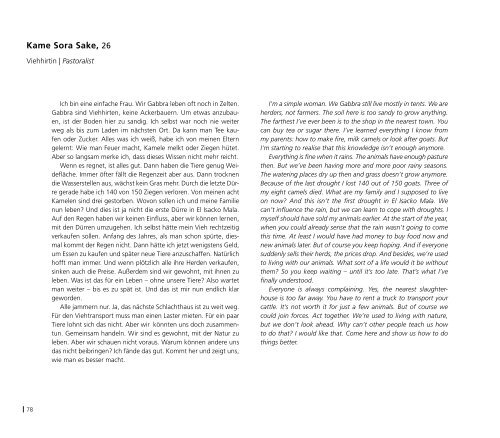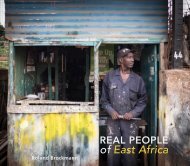Real People of East Africa. Roland Brockmann
From 2016 - 2017 I made four trips through Kenya and Tanzania - travelling over land by minibus, motorbike taxi or on foot. Not to search for something, but to meet the existing, was a great adventure. This photo & text book is about the people I met along my way. They talk about what concerns them: success, failure, love, hope... everyday life. The photos show the people in their living or working environment. And always at eye level. Comming out in december at Photo Edition Berlin. With Essays from Alexis Malefakis and Meja Mwangi. Hardcover. 24 x 21 cm, 112 Pages, 49 images. Language: German/English.
From 2016 - 2017 I made four trips through Kenya and Tanzania - travelling over land by minibus, motorbike taxi or on foot. Not to search for something, but to meet the existing, was a great adventure. This photo & text book is about the people I met along my way. They talk about what concerns them: success, failure, love, hope... everyday life. The photos show the people in their living or working environment. And always at eye level. Comming out in december at Photo Edition Berlin. With Essays from Alexis Malefakis and Meja Mwangi. Hardcover. 24 x 21 cm, 112 Pages, 49 images. Language: German/English.
Create successful ePaper yourself
Turn your PDF publications into a flip-book with our unique Google optimized e-Paper software.
Kame Sora Sake, 26<br />
Viehhirtin | Pastoralist<br />
Ich bin eine einfache Frau. Wir Gabbra leben <strong>of</strong>t noch in Zelten.<br />
Gabbra sind Viehhirten, keine Ackerbauern. Um etwas anzubauen,<br />
ist der Boden hier zu sandig. Ich selbst war noch nie weiter<br />
weg als bis zum Laden im nächsten Ort. Da kann man Tee kaufen<br />
oder Zucker. Alles was ich weiß, habe ich von meinen Eltern<br />
gelernt: Wie man Feuer macht, Kamele melkt oder Ziegen hütet.<br />
Aber so langsam merke ich, dass dieses Wissen nicht mehr reicht.<br />
Wenn es regnet, ist alles gut. Dann haben die Tiere genug Weidefläche.<br />
Immer öfter fällt die Regenzeit aber aus. Dann trocknen<br />
die Wasserstellen aus, wächst kein Gras mehr. Durch die letzte Dürre<br />
gerade habe ich 140 von 150 Ziegen verloren. Von meinen acht<br />
Kamelen sind drei gestorben. Wovon sollen ich und meine Familie<br />
nun leben? Und dies ist ja nicht die erste Dürre in El Isacko Mala.<br />
Auf den Regen haben wir keinen Einfluss, aber wir können lernen,<br />
mit den Dürren umzugehen. Ich selbst hätte mein Vieh rechtzeitig<br />
verkaufen sollen. Anfang des Jahres, als man schon spürte, diesmal<br />
kommt der Regen nicht. Dann hätte ich jetzt wenigstens Geld,<br />
um Essen zu kaufen und später neue Tiere anzuschaffen. Natürlich<br />
h<strong>of</strong>ft man immer. Und wenn plötzlich alle ihre Herden verkaufen,<br />
sinken auch die Preise. Außerdem sind wir gewohnt, mit ihnen zu<br />
leben. Was ist das für ein Leben – ohne unsere Tiere? Also wartet<br />
man weiter – bis es zu spät ist. Und das ist mir nun endlich klar<br />
geworden.<br />
Alle jammern nur. Ja, das nächste Schlachthaus ist zu weit weg.<br />
Für den Viehtransport muss man einen Laster mieten. Für ein paar<br />
Tiere lohnt sich das nicht. Aber wir könnten uns doch zusammentun.<br />
Gemeinsam handeln. Wir sind es gewohnt, mit der Natur zu<br />
leben. Aber wir schauen nicht voraus. Warum können andere uns<br />
das nicht beibringen? Ich fände das gut. Kommt her und zeigt uns,<br />
wie man es besser macht.<br />
I’m a simple woman. We Gabbra still live mostly in tents. We are<br />
herders, not farmers. The soil here is too sandy to grow anything.<br />
The farthest I’ve ever been is to the shop in the nearest town. You<br />
can buy tea or sugar there. I’ve learned everything I know from<br />
my parents: how to make fire, milk camels or look after goats. But<br />
I’m starting to realise that this knowledge isn’t enough anymore.<br />
Everything is fine when it rains. The animals have enough pasture<br />
then. But we’ve been having more and more poor rainy seasons.<br />
The watering places dry up then and grass doesn’t grow anymore.<br />
Because <strong>of</strong> the last drought I lost 140 out <strong>of</strong> 150 goats. Three <strong>of</strong><br />
my eight camels died. What are my family and I supposed to live<br />
on now? And this isn’t the first drought in El Isacko Mala. We<br />
can’t influence the rain, but we can learn to cope with droughts. I<br />
myself should have sold my animals earlier. At the start <strong>of</strong> the year,<br />
when you could already sense that the rain wasn’t going to come<br />
this time. At least I would have had money to buy food now and<br />
new animals later. But <strong>of</strong> course you keep hoping. And if everyone<br />
suddenly sells their herds, the prices drop. And besides, we’re used<br />
to living with our animals. What sort <strong>of</strong> a life would it be without<br />
them? So you keep waiting – until it’s too late. That’s what I’ve<br />
finally understood.<br />
Everyone is always complaining. Yes, the nearest slaughterhouse<br />
is too far away. You have to rent a truck to transport your<br />
cattle. It’s not worth it for just a few animals. But <strong>of</strong> course we<br />
could join forces. Act together. We’re used to living with nature,<br />
but we don’t look ahead. Why can’t other people teach us how<br />
to do that? I would like that. Come here and show us how to do<br />
things better.<br />
78




